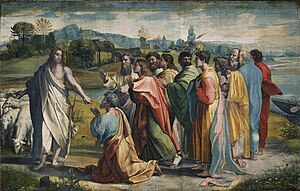 Charge to Peter: "Shepherd My sheep." posted by Jay Quine
Charge to Peter: "Shepherd My sheep." posted by Jay QuineThe word translated “pastor” is the word for “shepherd.”[1] A pastor is a shepherd of a flock of God’s people, serving under Jesus who is called the “chief shepherd” (1 Peter 5:4). In John 21, Jesus instructs the pastor/shepherd to feed the sheep.
To “feed the sheep” meant to teach them. A pastor is a teacher, as indicated by the grammatical construction in Ephesians 4:11 which really describe not two but one “pastor-teacher.”[2] A pastor is gifted in instructing others in ways of righteousness. A pastor is one who is sensitively concerned for the spiritual growth of the Lord’s people. He is gifted in encouraging others to live a life pleasing to the Lord, no matter what the circumstances.
What separates the pastor from a teacher who isn’t a pastor is leadership. From a close examination of several words used in the New Testament for leadership, we see that the pastor is also an elder and also an overseer of the church. This can be seen if we apply a little algebra!
In a quadratic formula, if A = B, and B = C, then what is the relationship between A and C? (take you time… … …). Okay, I’ll tell you—they’re equal. So, let’s apply that to the role of pastor-teacher as an elder and overseer of the church.
A = B
Elder = Overseer, according to Titus 1:5, 7
The reason I left you in Crete was that you might straighten out what was left unfinished and appoint elders in every town, as I directed you…Since an overseer is entrusted with God’s work, he must be blameless…
B = C
Overseer = Teacher, as seen in 1 Timothy 3:1-2
If anyone sets his heart on being an overseer, he desires a noble task. Now the overseer must be above reproach, the husband of but one wife, temperate, self-controlled, respectable, hospitable, able to teach.
So, according to algebra, certain elders are also teachers. This is confirmed in 1 Timothy 5:17.
The elders who direct the affairs of the church well are worthy of double honor, especially those whose work is preaching and teaching.
Let’s try again. Since certain elders (A) are also teachers (B):
A = B
Elders = Teachers, from 1 Timothy 5:17, and
B = C
Teacher = Pastor, from the grammatical construction in Ephesians 4:11, we would expect there to be an identity between the office of elder and gift of pastor. Not surprisingly, we find it in 1 Peter 5:1-2.
To the elders among you, I appeal as a fellow elder, a witness of Christ’s sufferings and one who also will share in the glory to be revealed: be shepherds of God’s flock that is in your care, serving as overseers—not because you must but because you are willing.
Conclusions:
1) The gifts of pastor-teacher and teacher are given today, to
2) shepherd others in the ways of God, through the teaching, guiding, and application the word,
3) with a passion to see believers nourished and grow in Christ.
4) The pastor is also serves as an overseer and elder of a local church.
Certain core values would accompany the gift of pastor-teacher. These decision shaping values influence the decisions of the one endowed with such a gift. Let’s look at how Timothy led his life.
It was likely Timothy’s gift was that of pastor-teacher. Encouraging his pastoral duties, Paul wrote him. “Until I come, give attention to the reading of Scripture, to exhortation and teaching. Do not neglect the spiritual gift within you.” (1Timothy 4:13-14) He was to “be ready to preach to word, in season and out of season.” (2Timothy 4:2) Likewise, embedded in 1 and 2 Timothy are words to encourage his pastoral leadership. Timothy was a servant of God, entrusted with the gift of pastor-teacher.
His values fit with his gift. Although he likely struggled with the desire for things of the world, his values would mature. He was to lead the disciplined life of a soldier or an athlete (2Timothy 2:3-5). His values would reflect a low need for physical comfort, and high priority toward those values reflecting a need to enhance the lives of others.
[1]See poimen, in Bauer, Arndt, Gingrich and Danker, A Greek-English Lexicon of the New Testament, University of Chicago Press, 1979 p. 684.
[2]See Hoehner, Ephesians, pp. 543-44 where, after observing the one article for the two gifts joined by the “and” (kai) as explicative (“pastors, that is teachers”), he concludes that even if two separate groups, one is a subset of the other. In other words, all pastors are to be teachers, but not all teachers are pastors.

